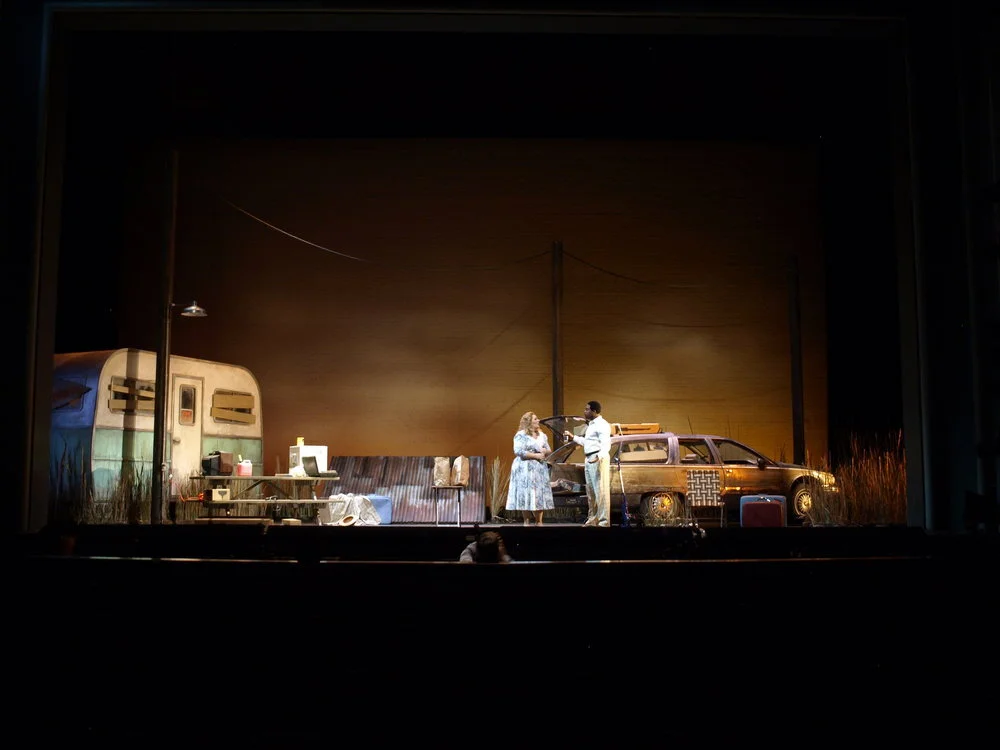The Feast
The Feast opens on and follows the fortunes of The Raft - a small homeless community squatting in an abandoned building in the 9th Ward on the eve of Hurricane Katrina’s landfall. The opera explores themes of isolation, the unknowable pieces of each other in community and how we mutate to strange new selves by sacrificing freedom and individuality.
The Raft isn’t exactly a tight-knit community forged by any sense of camaraderie but a tenuous group held together by the demands of necessity: the necessity of community for survival (finding food, providing whatever makeshift medical support they can), the necessity of community for sanity (staving off loneliness, helping those with mental health issues mitigate against their worst impulses). While there are some younger members -- run-aways and crust punks, mostly -- The Raft is composed of older hands who have been homeless so long they can barely remember what life was like before their current situation; the day-in and day-out of their dispossessed lifestyle is simply a matter of fact. There’s nothing didactically tragic in our presentation of their lifestyles but also nothing romantic about their situation: their isolation from traditional society may lead to a lonely, precarious nightmare existence but it’s one they’ve at least come to accept as fact.
Unfortunately, their resignation to this separation from the larger world sabotages them when Katrina makes landfall without their knowledge. We know the story -- the storm hits Louisiana and pushes the waters of Lake Ponchatrain over and through the levees -- but to the members of The Raft it feels like the end of the world, the sky being ripped open and the oceans rising to levels they’ve never seen that also deposits some bizarre, mammoth kind of sea-life in their literal backyard.
Except it doesn’t really seem like any sea life these people -- natives of the region, for the most part -- have ever seen in their long, strange lives. For one thing, it doesn’t have scales but a kind of oily membrane that exists somewhere between liquid and solid and which is constantly shifting; for another it ceaselessly pipes out from some organ they can’t see a low melody that starts to sound like ambient madness filling their heads with stranger and stranger ideas and visions, including one they can’t seem to shake: it wants them to eat it. Finally, and maybe even most disconcertingly, it survives days and days removed from water.
It’s with these conditions that those members of the community who survived Katrina’s biblical nightmare are forced to carry on trying to make do in a New Orleans more inhospitable than ever to them: all the food is spoiling, there are no left-overs to scrounge through, no money to make from the guilt ridden tourist.
Starving in an area that is environmentally isolated from all others and unable to scavenge even in their own community for fear of drawing the attention and ire of violent competitors, the group eventually resolves to divide the thing in their backyard in lieu of starving to death.
As solutions for staving off hunger go it works well enough for a time, but signs soon manifest that all’s far from well, first in the mutating behavior and body of one of the runaway’s dogs, which exhibits marked increases in aggression and then a bizarrely mutated morphology, then in changes to the same for the members of The Raft, all of whom start to exhibit symptoms of some kind of disease and all of whom start to hear more clearly than ever the voice from that entity only now it’s directly in their heads, unmediated by distance or lack of understanding.
There seems to be no rhyme or reason to the way it infects and whom it first affects (young seems as susceptible as old) but what the members do notice is that much as they might be repulsed by the degradation of others in the throes of affliction, once they themselves are infected they begin to experience a kind of reverie that they can’t possibly resist or explain, one that paradoxically divides the group through stranger and stranger mutations while bringing them together in an ever maddening chorus of community.








